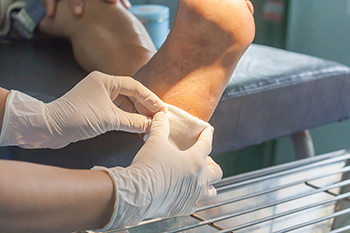
Open wounds on the feet can vary in severity and type, each requiring specific care. Abrasions are superficial injuries resulting from friction, They often cause the outer layer of skin to rub off, leading to redness and mild bleeding. Lacerations are deeper cuts that can vary in length and depth, often caused by sharp objects,. They may require stitches for proper healing. Avulsions occur when a portion of the skin is torn away, potentially exposing deeper layers and necessitating immediate medical attention. Puncture wounds result from objects piercing the skin, such as nails or splinters, which can introduce bacteria and lead to infection if not treated properly. Understanding these types of wounds is vital for effective first aid and healing. If you have a foot wound, it is suggested that you consult a podiatrist who can determine what type it is and offer effective treatment methods.
Wound care is an important part in dealing with diabetes. If you have diabetes and a foot wound or would like more information about wound care for diabetics, consult with Tanisha Richmond, DPM from Richmond Foot & Ankle, LLC. Our doctor will assess your condition and provide you with quality foot and ankle treatment.
What Is Wound Care?
Wound care is the practice of taking proper care of a wound. This can range from the smallest to the largest of wounds. While everyone can benefit from proper wound care, it is much more important for diabetics. Diabetics often suffer from poor blood circulation which causes wounds to heal much slower than they would in a non-diabetic.
What Is the Importance of Wound Care?
While it may not seem apparent with small ulcers on the foot, for diabetics, any size ulcer can become infected. Diabetics often also suffer from neuropathy, or nerve loss. This means they might not even feel when they have an ulcer on their foot. If the wound becomes severely infected, amputation may be necessary. Therefore, it is of the upmost importance to properly care for any and all foot wounds.
How to Care for Wounds
The best way to care for foot wounds is to prevent them. For diabetics, this means daily inspections of the feet for any signs of abnormalities or ulcers. It is also recommended to see a podiatrist several times a year for a foot inspection. If you do have an ulcer, run the wound under water to clear dirt from the wound; then apply antibiotic ointment to the wound and cover with a bandage. Bandages should be changed daily and keeping pressure off the wound is smart. It is advised to see a podiatrist, who can keep an eye on it.
If you have any questions, please feel free to contact our office located in Dayton, OH . We offer the newest diagnostic and treatment technologies for all your foot care needs.